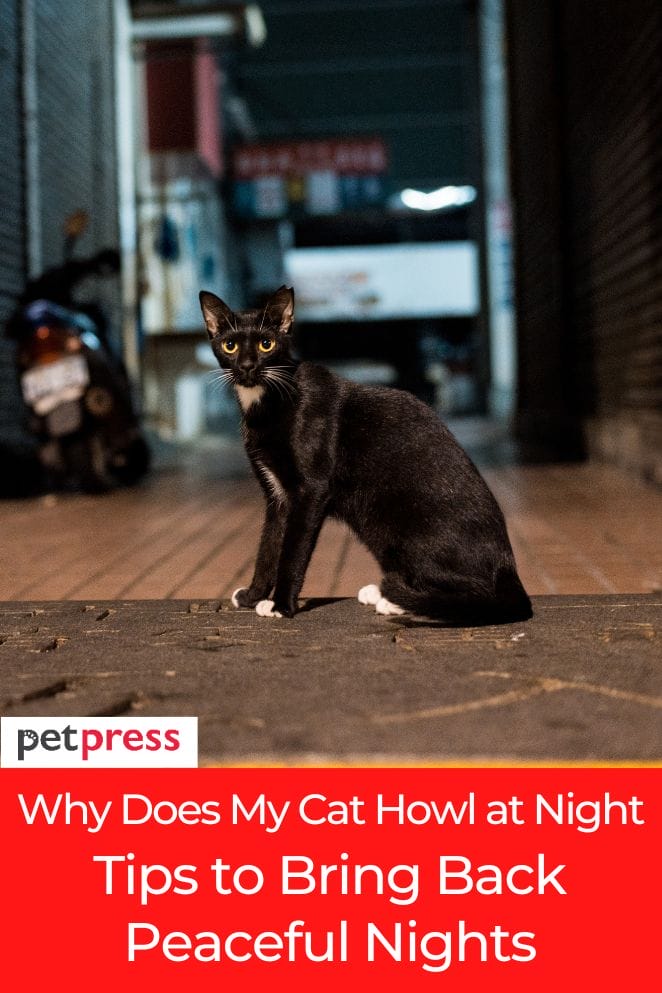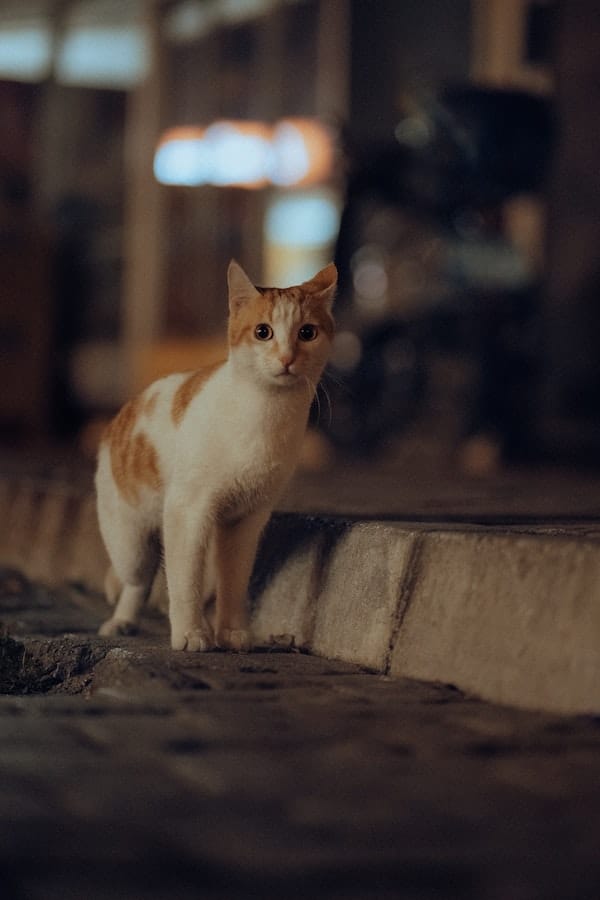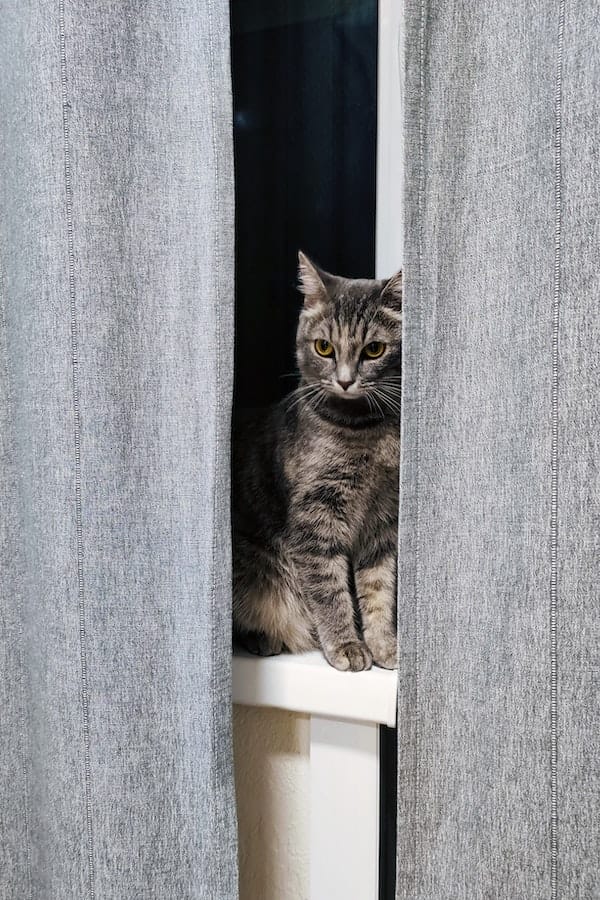
If you’ve ever shared your life with a cat, you’ve likely encountered those mysterious midnight serenades when your feline companion decides to belt out what seems like a moonlit symphony.
But why, you may wonder, does a cat howl at night?
This nocturnal behavior can indeed be quite puzzling, but fret not; we’re here to unravel the enigma and help you regain those tranquil nights of slumber alongside your beloved furball.
Why Does a Cat Howl at Night

Before we dive into solutions, let’s uncover the reasons behind your cat’s nighttime vocal performances:
Communication
Cats, by nature, are crepuscular creatures, meaning they are most active during the gentle hours of dawn and dusk.
So, when your furry companion decides to serenade you with those distinctive howls at night, it’s often their way of communicating.
They may be signaling their presence, reaching out to other cats in the vicinity, or even trying to attract potential prey.
Loneliness
Now, if your cat finds themselves alone in the quiet darkness of night, those howls might be their way of expressing a sense of loneliness or boredom.
They long for companionship and seek your attention as a way to alleviate their solitude.
Aging and cognitive decline
As our feline friends grow older, much like us humans, they can experience cognitive decline.
Those nighttime howls may indicate confusion or disorientation, especially if your cat has entered their senior years.
It’s their way of letting you know that they might be feeling a bit lost in the dark.
Health issues
Sometimes, those midnight howls from your feline companion can be an SOS signal for an underlying health concern.
If your cat’s howling suddenly becomes more frequent or unusual in tone, it’s crucial to consider the possibility of medical issues.
Pain or discomfort caused by health problems can lead them to vocalize their distress.
Boredom
Cats are creatures of the crepuscular realm, most active when the world transitions between day and night.
If your cat’s daytime routine lacks stimulation or physical activity, they might unleash their pent-up energy in the form of nighttime howls.
This behavior could be their way of telling you they need more playtime and engagement during the day to tire them out when the sun sets.
Territorial marking
Cats are famously territorial beings, and sometimes, those nightly serenades could be their attempt to establish or defend their territory.
If they sense a perceived threat, whether it’s from another animal or even an unfamiliar person in their domain, the howling might serve as a vocal boundary marker.
Mating instinct
Unspayed or unneutered cats may unleash their vocal prowess at night to broadcast their readiness for mating.
This can be particularly noticeable during the breeding season, when their hormones are in full swing, and they’re on a mission to attract potential mates.
How to Stop Your Cat from Howling at Night

Now, let’s explore practical steps to bring those nighttime howling sessions under control:
Interactive play
One effective strategy to quell your cat’s nighttime howling is to engage them in interactive play during the evening hours.
This serves a dual purpose: it provides mental and physical stimulation while also tiring them out before bedtime.
Opt for toys that mimic the thrill of the hunt, such as feather wands or laser pointers, as they tap into your cat’s innate instincts and offer a satisfying outlet for their energy.
Establish a routine
Cats are creatures of habit, and they thrive on routines.
By setting a consistent schedule for feeding and playtime, you create a sense of predictability in your cat’s life.
They’ll come to anticipate these interactions, knowing when to expect your attention and meals.
This can help reduce their restlessness at night, as they’ll align their activity with your established routine.
Provide Companionship
If loneliness is a driving force behind your cat’s nocturnal howling, it might be worth considering adopting a second feline companion.
Having a playmate can significantly alleviate their sense of isolation during the night.
Make sure to introduce the new cat properly and ensure they get along before expecting harmony in your household.
Over time, the companionship of another cat can work wonders in reducing nighttime vocalizations.
Consult Your Vet
If your cat’s nighttime howling persists or is accompanied by any worrisome symptoms, it’s always wise to consult your trusted veterinarian.
They can conduct a thorough examination to rule out any potential underlying health issues that might be triggering this behavior.
It’s better to be safe and ensure your cat’s well-being.
Plenty of exercise and stimulation during the day
To prevent those late-night serenades, ensure your cat enjoys an active and engaging daytime routine.
Dedicate time to play with them using interactive toys, take them for walks if they’re leash-trained, or provide puzzle toys that challenge their cognitive abilities.
A well-exercised and mentally stimulated cat is more likely to settle down for a peaceful night’s sleep.
Conclusion
Ultimately, grasping the reasons behind your cat’s nighttime howling sets the stage for more serene and restful nights for both you and your furry companion.
By tending to their communication needs, considering the benefits of companionship, and upholding a reliable routine, you can effectively manage and potentially diminish this behavior.
As a result, you’ll find yourself relishing peaceful nights alongside your beloved feline friend once more.
FAQs
Yes, cats are naturally crepuscular and can be more active during the night. Howling is a common behavior, but it can be managed.
If your cat’s howling is sudden, unusual, or accompanied by other concerning signs like changes in appetite or mobility, consult your vet for a thorough checkup.
Yes, stress can trigger nighttime howling in cats. Creating a stress-free environment and providing enrichment can help reduce this behavior.
In many cases, introducing a second cat can provide companionship and reduce nighttime howling. However, it’s essential to ensure a proper introduction process between the cats.


GIPHY App Key not set. Please check settings